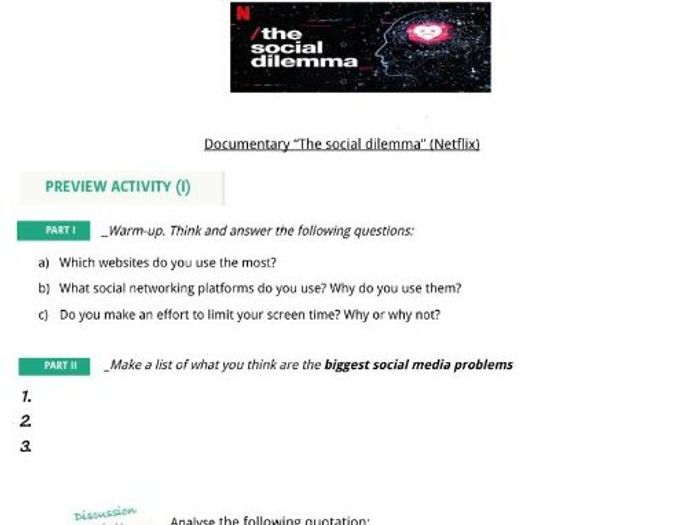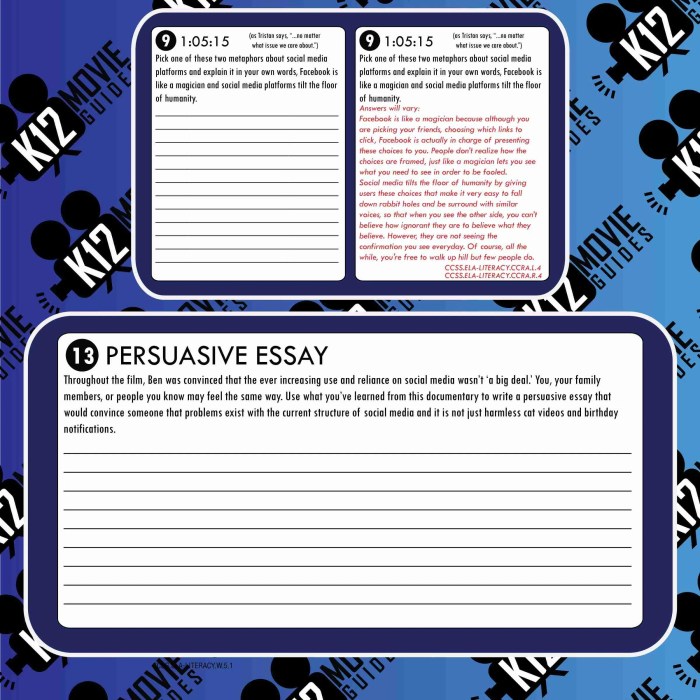Embarking on an intellectual odyssey, we delve into the enigmatic realm of the Social Dilemma Worksheet Answers, where the profound insights unveiled illuminate the intricate tapestry of social media’s impact on our lives. As we unravel the ethical quandaries and psychological mechanisms at play, a path emerges, empowering us to navigate the digital landscape with informed choices and a renewed sense of agency.
Within the confines of this discourse, we embark on a comprehensive exploration of social media’s pervasive influence, unraveling its potential for both societal betterment and individual detriment. Ethical concerns surrounding privacy, data exploitation, and the dissemination of misinformation are meticulously examined, prompting a critical reassessment of our relationship with these ubiquitous platforms.
Introduction to ‘The Social Dilemma’ Worksheet: The Social Dilemma Worksheet Answers

The ‘Social Dilemma’ Worksheet is a comprehensive educational resource designed to accompany the thought-provoking documentary of the same name. It delves into the intricate world of social media and its profound impact on our society.
The documentary ‘The Social Dilemma’ exposes the manipulative tactics employed by social media platforms to capture our attention and influence our behavior. It features interviews with former tech insiders who candidly reveal the hidden algorithms and design choices that shape our online experiences.
Significance of ‘The Social Dilemma’
The ‘Social Dilemma’ documentary has sparked global conversations about the ethical implications of social media and its potential consequences for individuals and society as a whole. It has raised awareness about the need for critical thinking and responsible use of these powerful platforms.
Understanding Social Media and Its Impact
Social media platforms have become an integral part of our lives, connecting us with friends and family, providing us with information, and influencing our thoughts and behaviors. To fully comprehend the impact of social media, it is essential to understand the key concepts and mechanisms that drive these platforms.
Key Concepts and Terms, The social dilemma worksheet answers
- Social media platform:A website or application that allows users to create and share content, interact with others, and build communities.
- User-generated content:Content created by users, such as posts, comments, and videos.
- Algorithms:Computer programs that determine what content users see and in what order.
- Engagement:Measures of user interaction, such as likes, shares, and comments.
- Filter bubble:A personalized view of the internet that only shows users content that aligns with their existing beliefs and interests.
- Echo chamber:A space where users only interact with others who share their views, leading to a reinforcement of those views.
Mechanisms and Algorithms
Social media companies use a variety of mechanisms and algorithms to engage users and maximize their time spent on the platform. These include:
- Personalized feeds:Algorithms that tailor content to each user’s interests based on their past behavior.
- Notifications:Alerts that inform users of new content, messages, or interactions.
- Gamification:Features that reward users for engagement, such as badges or points.
- Targeted advertising:Algorithms that show users ads based on their demographics, interests, and behavior.
Potential Positive and Negative Effects
Social media has both positive and negative effects on individuals and society. Some potential benefits include:
- Increased social connection:Social media allows users to stay connected with friends and family who live far away.
- Access to information:Social media can be a valuable source of news and information, particularly in real-time situations.
- Community building:Social media can facilitate the creation of online communities based on shared interests or identities.
However, social media also has some potential drawbacks, such as:
- Addiction:Social media can be addictive, leading users to spend excessive amounts of time on the platform.
- Privacy concerns:Social media companies collect a vast amount of data about their users, which can raise concerns about privacy and surveillance.
- Spread of misinformation:Social media can be a breeding ground for the spread of false or misleading information, which can have serious consequences.
- Negative impact on mental health:Studies have shown that excessive social media use can be associated with anxiety, depression, and other mental health issues.
Understanding the key concepts, mechanisms, and potential effects of social media is crucial for navigating these platforms in a healthy and informed manner.
Ethical Implications of Social Media
Social media has revolutionized communication and information sharing, but its ethical implications require careful consideration. Ethical concerns arise from issues of privacy, data collection, the spread of misinformation, and the influence of social media on public opinion and behavior.
Privacy and Data Collection
Social media platforms collect vast amounts of data from their users, including personal information, browsing history, and location. This data is often used to personalize advertising and content, but it also raises concerns about privacy and surveillance. Users may not be fully aware of the extent to which their data is collected and used, and there is a risk of this data being misused or compromised.
Spread of Misinformation
Social media has become a major source of news and information, but it also provides a fertile ground for the spread of misinformation and disinformation. False or misleading information can spread rapidly on social media platforms, potentially influencing public opinion and decision-making.
Social media companies have a responsibility to address this issue and to ensure that their platforms are not used to disseminate harmful or inaccurate information.
Influence on Public Opinion and Behavior
Social media platforms have become powerful tools for shaping public opinion and influencing behavior. Social media campaigns can be used to promote political agendas, sway elections, and influence consumer choices. While social media can be used for positive purposes, it also raises concerns about manipulation and the potential for social media companies to exert undue influence on society.
Critical Thinking and Informed Decision-Making
Critical thinking is paramount when navigating social media, where a deluge of information, both credible and dubious, confronts us. It empowers individuals to discern the veracity of content, identify biases, and make judicious decisions regarding their social media consumption.
Evaluating Credibility and Identifying Biases
Scrutinizing the source of information is crucial. Reputable organizations, academic institutions, and established news outlets typically adhere to journalistic standards, ensuring accuracy and objectivity. Conversely, anonymous sources, websites with glaring grammatical errors, or content with a clear agenda should be approached with caution.Moreover,
recognizing biases is equally important. Media outlets may have political leanings that influence their reporting, while individuals often seek information that aligns with their existing beliefs. Identifying these biases helps us assess the objectivity and reliability of the content we encounter.
Media Literacy and Informed Decision-Making
Media literacy encompasses the ability to critically evaluate, understand, and produce media messages. It equips individuals with the skills to navigate the complexities of social media, decipher its potential effects, and make informed decisions about their usage.By fostering media literacy, individuals can:
- Identify and resist misinformation and disinformation.
- Understand the algorithms and design features that shape their social media experiences.
- Make conscious choices about the amount of time they spend on social media.
- Protect their privacy and personal information.
Empowering individuals with media literacy is essential for responsible social media usage and informed decision-making in the digital age.
Personal Strategies for Healthy Social Media Use

To minimize the negative effects of social media, individuals can adopt several strategies. These include setting limits, managing notifications, fostering meaningful interactions, and promoting well-being.
Limiting social media usage can prevent excessive consumption and its associated negative consequences. Individuals can set daily time limits, utilize screen time tracking apps, and designate specific times for social media engagement.
Managing Notifications
Notifications can be distracting and overwhelming. Managing them involves disabling unnecessary notifications, customizing settings to prioritize essential alerts, and limiting the frequency of notifications.
Fostering Meaningful Interactions
Social media can facilitate meaningful connections. Individuals can prioritize following accounts that provide value, engage in thoughtful discussions, and connect with friends and family on a personal level.
Promoting Well-being
Maintaining a healthy relationship with social media requires promoting well-being. This includes avoiding comparisons, practicing self-care, and engaging in activities that bring joy and fulfillment.
FAQ Insights
What is the primary objective of the Social Dilemma Worksheet?
The Social Dilemma Worksheet aims to foster critical thinking about social media’s impact, promote ethical considerations, and empower individuals with strategies for responsible usage.
How do social media companies manipulate user engagement?
Social media algorithms employ various techniques, such as personalized content feeds, notifications, and gamification, to capture and retain user attention.
What are the key ethical concerns associated with social media?
Privacy violations, data misuse, the spread of misinformation, and the potential for manipulation and addiction are among the primary ethical concerns raised by social media.